Fall 2024 Newsletter
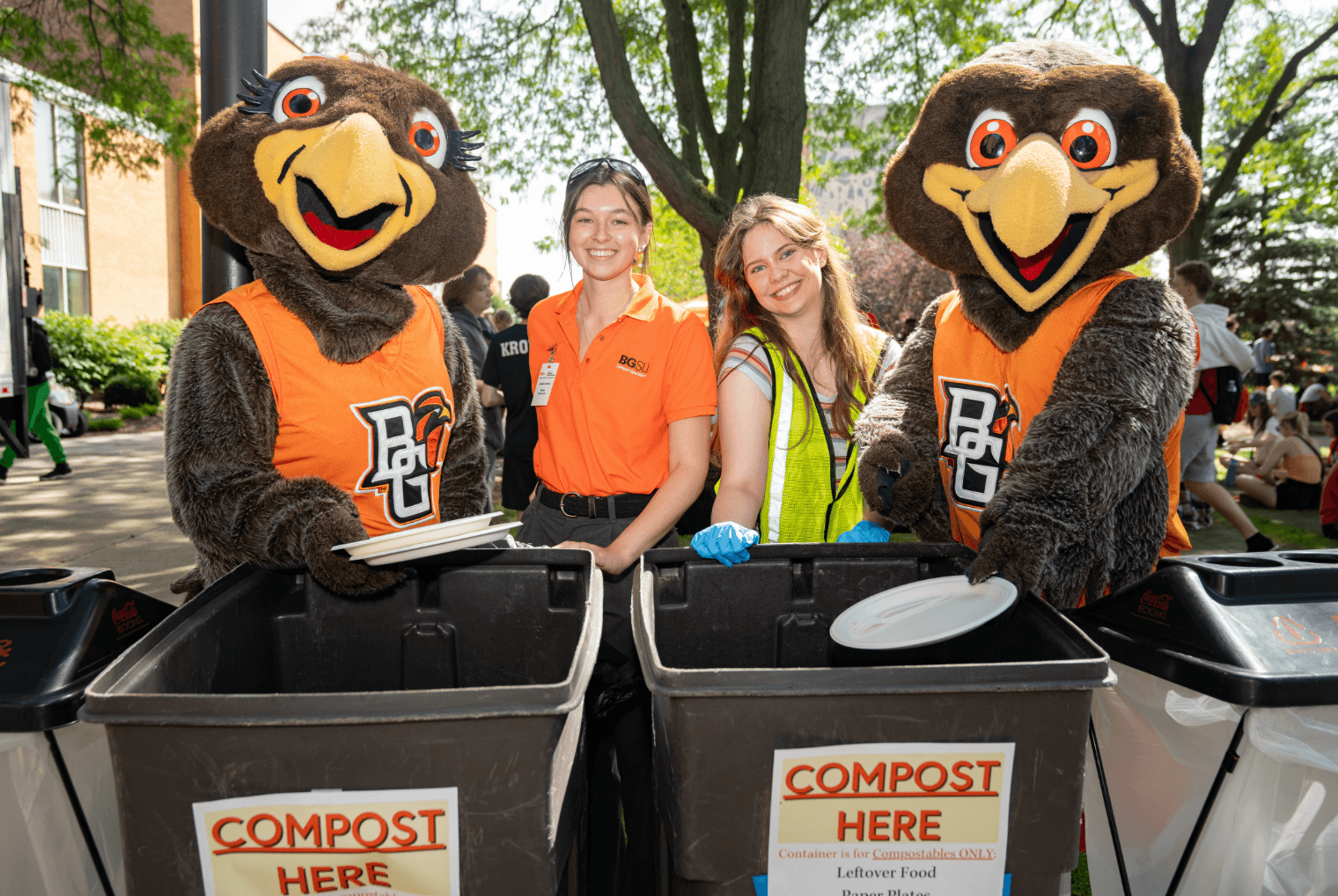
Is there an "Away"?
Waste Reduction Efforts at BGSU
By Dr. Nick Hennessy
Sustainability Manager
We are taught from an early age to throw things “away” when we don’t want something anymore. The ever-present trash can or waste basket is a standard feature in nearly every room, hallway or space, and this extends to the outdoors as well. At institutions such as Disney theme parks, there are actual rules for how often guests should have access to a trash can, and certainly we have our share of waste container options here on campus. Disposable/single use packaging, containers, and a legion of other items are sold and used every second of the day, all for our “convenience” and to satisfy our busier than ever schedules and lifestyles. Getting “rid” of stuff is often glorified and set as a goal in the multitude of books aiming to help us “declutter” from our many possessions. Food, while scarce in many other countries and even here in the U.S., is a regular part of our waste stream.
At best we are a wasteful society and at worst, a selfish, careless, irresponsible and even unethical society. We console ourselves by recycling what we can and throwing away the rest. But the reality is that there is NO “away”. Even though it might not be in our view anymore, everything “thrown away” ends up somewhere else, often with devastating impact on the environment. Among the “Laws of Ecology”, noted by ecologist Barry Commoner in his classic book “The Closing Circle: Nature, Man & Technology” and included in the Introduction to Environmental Studies curriculum at BGSU and elsewhere is that everything must go somewhere. Let’s transpose this worldwide program to our own campus. Voluminous amounts of trash produced by us as a university (nearly 150,000 pounds per week on average), are thrown “away”, and end up in a landfill, where the huge majority of items will never ever see the light of day or break down, at least for thousands of years. Even worse, a lot of that material produces methane gas and other hugely damaging greenhouse gases while in that landfill. Much of the material meant for the landfill ends up in waterways, and ultimately pollutes lakes and oceans, where single use plastics will outnumber living organisms in a fairly short period of time in the future.
But wait; there is some hope on the horizon, and it doesn’t have to be this way. However, we all have an essential role in changing the deluge of waste that we currently produce daily. Waste reduction/resource conservation is a BGSU sustainability goal. Throughout the month of October we have been focusing on waste reduction through some dedicated programming and activities during Campus Sustainability Month. But there are also efforts that are ongoing and year-round. Campus Sustainability carefully tracks every pound of waste that we create as a university, as well as every pound that we divert from the waste stream in some way. Through a variety of procedures, we keep many thousands of pounds of potential waste out of the landfill. And in doing so, we establish what’s known as a “diversion rate” which we carefully monitor and constantly seek to improve. We all have an opportunity and a responsibility to reduce waste at BGSU by knowing and understanding the things we can do in our day-to-day activities to help divert that waste. What are some things we can do?
Don’t Just Toss: You may have unwanted/unneeded items in your offices as a result of cleaning out spaces, buying new items, or just oversupply, do not simply throw these items “away”. Rather, contact Campus Sustainability and donate them to the “Re store”, which is BGSU’s reuse concept. The Campus ReStore makes gently used and even new items available to BGSU students, faculty and staff at monthly events for no cost, giving these items a new home and use. Office supplies, binders, paper, books, decorations, small furniture (large furniture would go to Surplus), household items, electronics, clothing and much more can be donated. An online Maintenance Request asking Campus Sustainability to pick up the items is all that is needed.
Know Our Recycling Programs: The commingle recycling bins in all university buildings are for plastic bottles, cans (both aluminum and steel), glass bottles and jars, office paper/newspaper and cardboard. The orange dumpsters behind most buildings are for recycling also. There are clearly illustrated signs on all these containers with the current list of accepted items. There is also a plastic bag recycling container in the lobby of the Union, outside Falcon Outfitters. Electronics of all kinds, including equipment, batteries, appliances, lamps, and basically anything with a cord or that is battery operated are regularly recycled through BGSU’s electronics recycling vendor, AIM Ecycling. Submit an online Maintenance Request for a pickup. Campus Sustainability will consult with you if you aren’t sure what to do with something or have a large volume of items to get rid of.
Think Before Purchasing: If you can avoid making a purchase in the first place, you’ve saved money as well as conserved resources. Check out the Campus ReStore in the McDonald Hall Annex because you very well might find what you are looking for there.
Consider Govdeals.com: BGSU offices can sell items they no longer want and get the financial credit for that through listing the items on govdeals.com Each year thousands of items are sold and multiple tons are diverted from the landfill. Everything from vehicles to furniture and all things in between have been successfully sold on govdeals. Submit an online Maintenance Request and describe the items you want to sell on govdeals.
Together, our seemingly small and isolated efforts to reduce waste add up. The more we all know about the waste reduction opportunities available to us right here on campus, the more we can raise our diversion rate! Remember that Campus Sustainability is always available to answer questions or provide assistance to help our office achieve our sustainability goals.
Celebrating Sustainability at BGSU
A Recap of Campus Sustainability Month Events
By Alexa Zvanovec
Campus Sustainability Intern
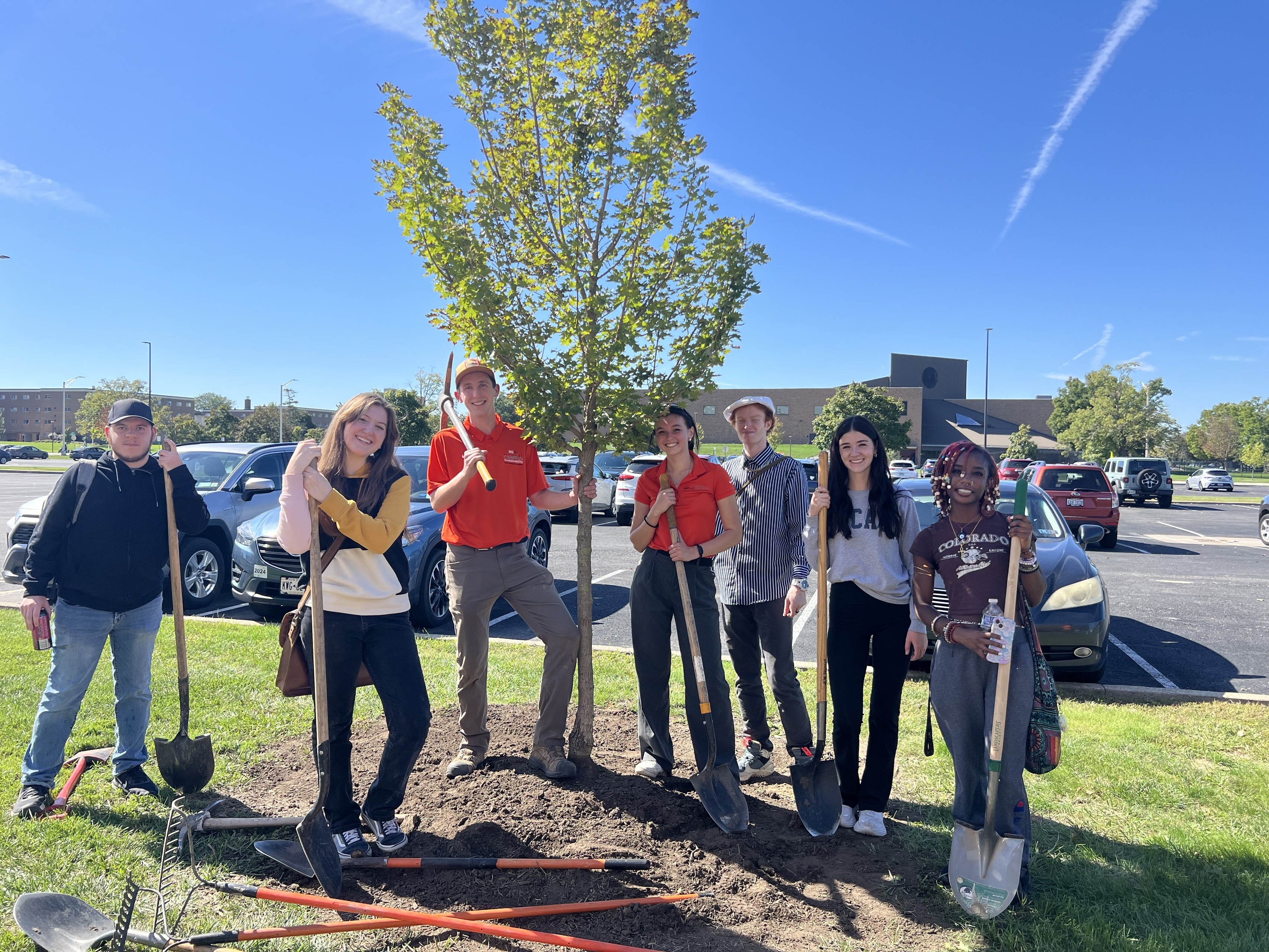
October is Campus Sustainability month, where higher education institutions such as BGSU celebrate sustainability by holding events such as service projects, waste reduction initiatives, educational programs and much more! At BGSU sustainability is more than just a buzzword; it’s a commitment to advocating for sustainable practices on campus and creating opportunities for students to become involved and engaged. Our theme this year was waste reduction, our tagline being Zoomba Into Sustainability. Over the past few weeks, we have hosted events that not only promoted environmental awareness but also created a sense of community involvement. Here is a recap of our version of Campus Sustainability Month:
Sustainability Trivia Night
On Wednesday, October 9th, students and community members gathered for a spirited Sustainability Trivia Night. This event combined fun with education as attendees tested their knowledge on waste and emissions reduction and other sustainability issues. With prizes on the line, participants learned about the environmental impact of waste both locally and globally. It was an evening filled with friendly competition and valuable insights, reinforcing the importance of sustainability in our daily lives. The winners received small succulents as their prizes.
Fall Colors Bike Tour on Slippery Elm Trail
On Sunday, October 13th, BGSU’s Outdoor Adventure Club joined with Campus Sustainability on a vibrant Fall Colors Bike Tour along the picturesque Slippery Elm Trail. Participants brought their own bikes and enjoyed a scenic ride, appreciating the beautiful ecosystems in our area. This event highlighted the importance of outdoor recreation and sustainable transportation, allowing attendees to immerse themselves in nature while promoting a healthier lifestyle. Meeting at the BGSU Bike Garage, participants came together to enjoy the crisp autumn air and the stunning early fall foliage.
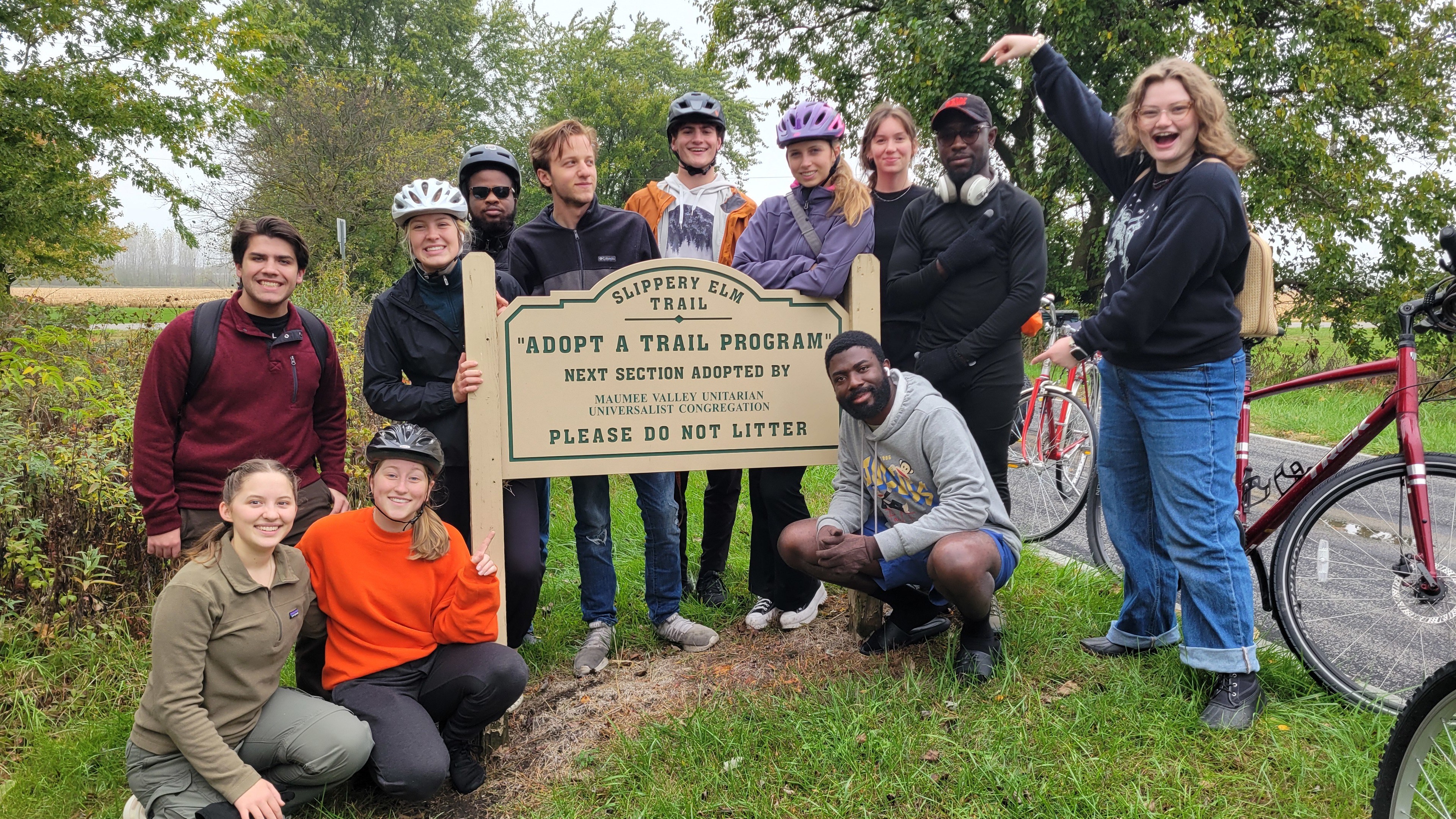
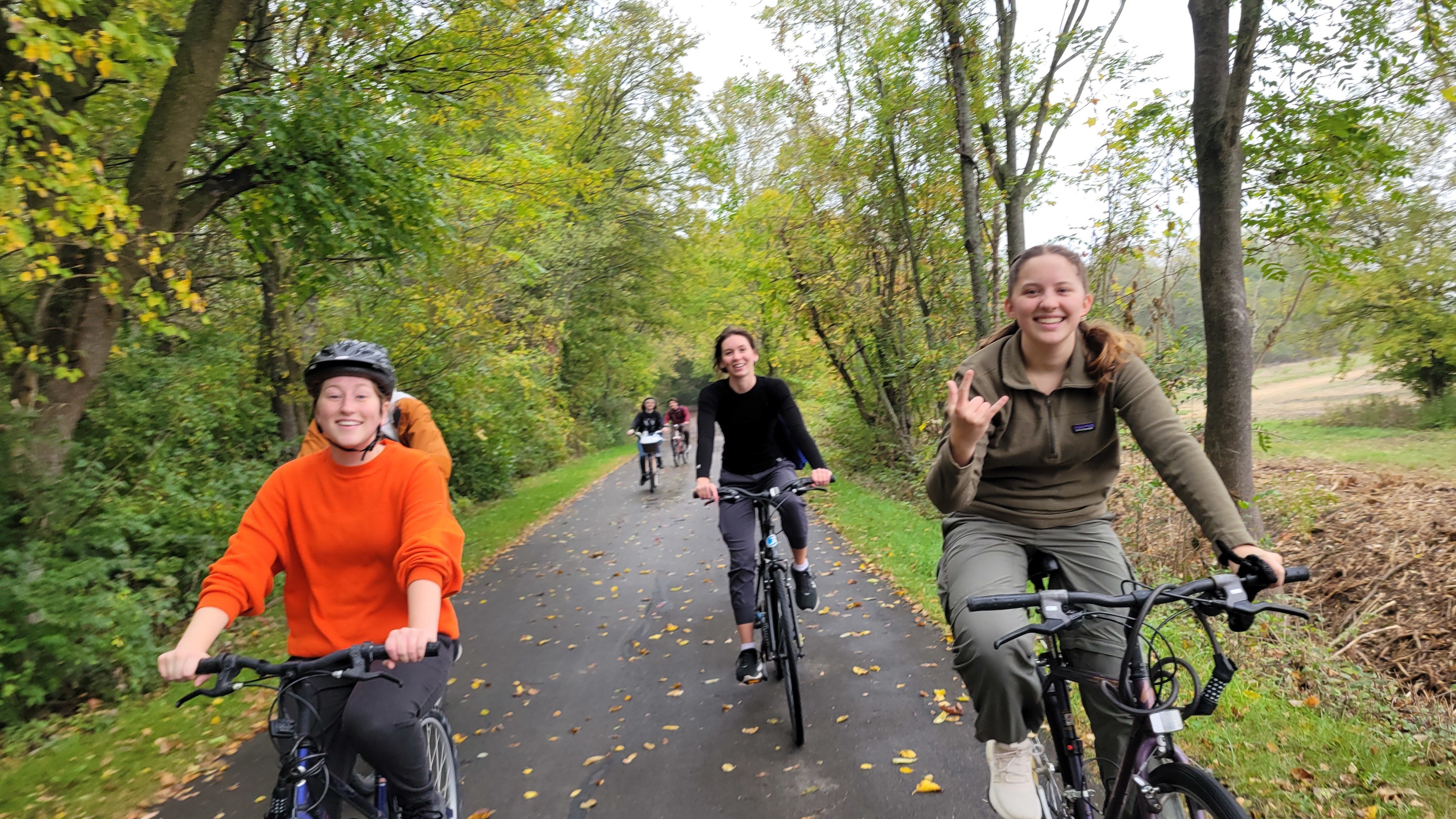
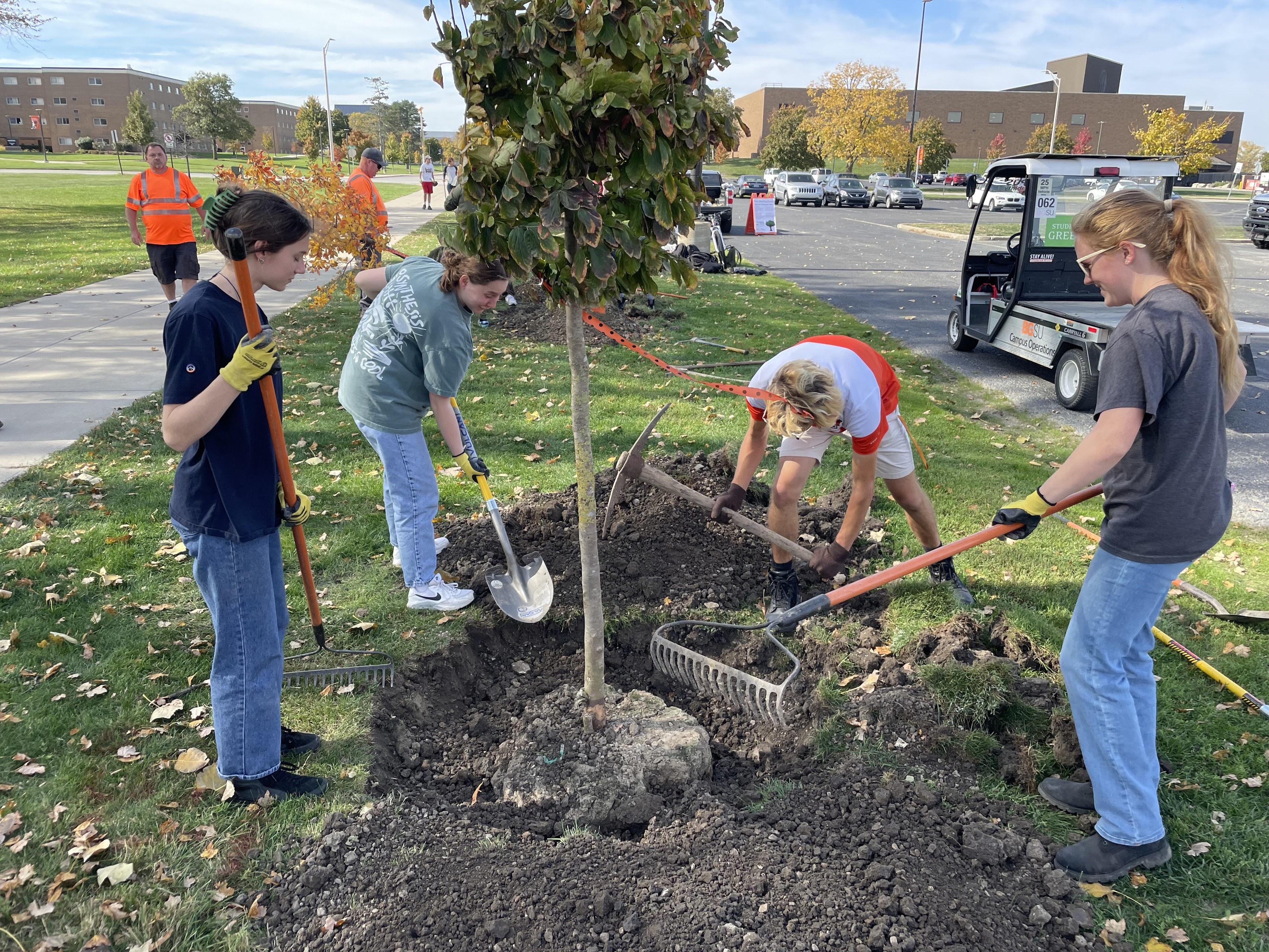
Tree Plantings
Three tree planting service projects took place in October. Fall is the perfect time to plant trees, and volunteers joined together to enhance our campus environment. Each tree planted contributes to carbon sequestration and oxygen production, making a long-lasting impact on our planet. Supplies were provided, and participants signed up through BGSUserves, ensuring a hands-on experience that connected individuals to the natural world. A total of 28 trees were planted, all being species native to Ohio. Eighteen trees were planted at the Slater Family Ice Arena and ten others were planted along Stadium Drive near the Doyt L. Perry Stadium. The trees were purchased utilizing an award provided by the Student Green Initiatives Fund.
Film Screening: Single-Use Planet
On Monday, October 14, we hosted a screening of the award-winning documentary Single-Use Planet. This powerful film delves into the crisis of single-use plastics, exploring their devastating effects on our oceans and public health. After the screening, attendees enjoyed free snacks and participated in a discussion about the pressing issues raised in the film, reinforcing our commitment to reducing plastic waste in our community.
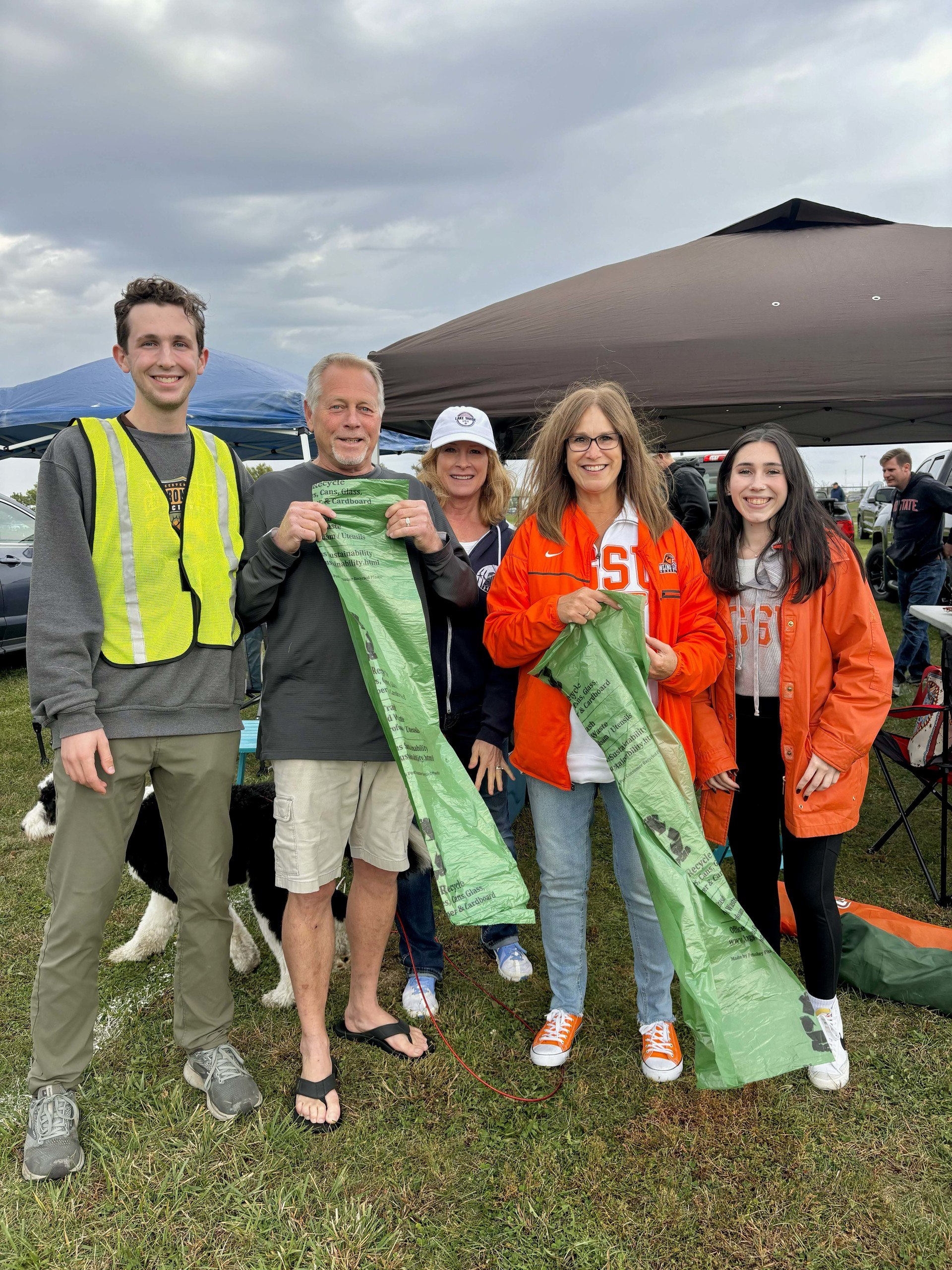
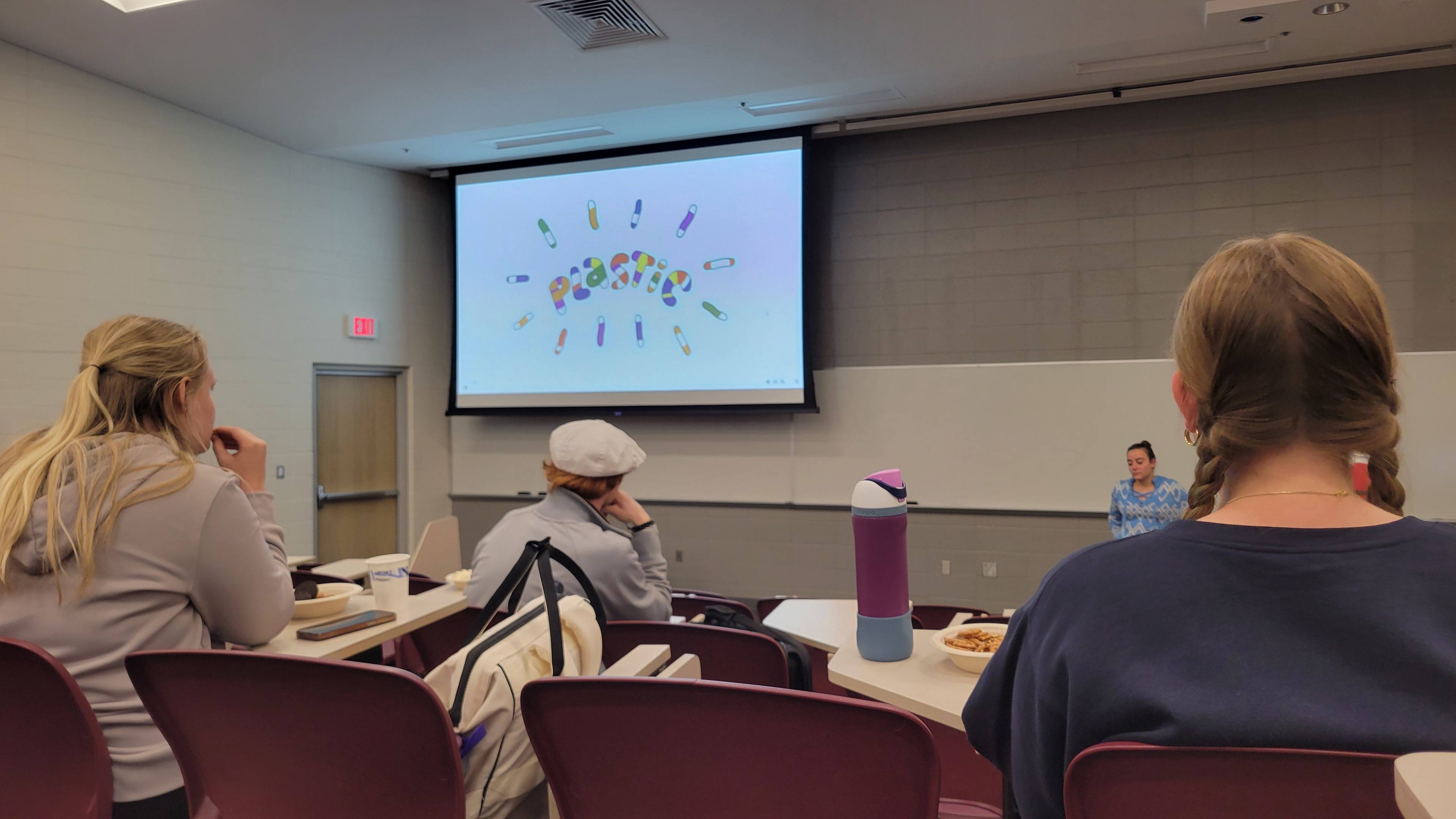
Green Game Days
Saturdays, October 12th, and October 19th marked our Green Game Day initiative, where volunteers engaged with the BGSU community at the home football games. Volunteers drove golf carts, interacted with fans, and helped distribute recycling bags while collecting and sorting full bags. This initiative aimed to reduce waste and promote recycling, proving that gameday can be both fun and environmentally friendly. Shifts were available for those eager to make a difference while enjoying the excitement of college football. These efforts make a significant difference! For example, at the October 19th game during Falcon Family Weekend, our group filled six dumpsters with recyclable cans, plastic and glass bottles, and cardboard. That's approximately 10,368 gallons of solid materials that would've otherwise ended up in a landfill! Recycling, while not as good as reducing or reusing materials, makes a positive impact on the environment and reduces carbon emissions by re-introducing these materials into the manufacturing stream as opposed to using virgin materials.
Campus ReStore Event
The Campus Restore October event took place on October 24th! The ReStore is a periodic thrift store that is open to the BGSU campus community. During any given event, we usually welcome between 250-300 shoppers in a matter of two hours. Attendees helped us reduce waste and conserve natural resources that would otherwise be needed to make new items, rather than used. Student volunteers helped us staff the store and facilitated the reuse of thousands of items.
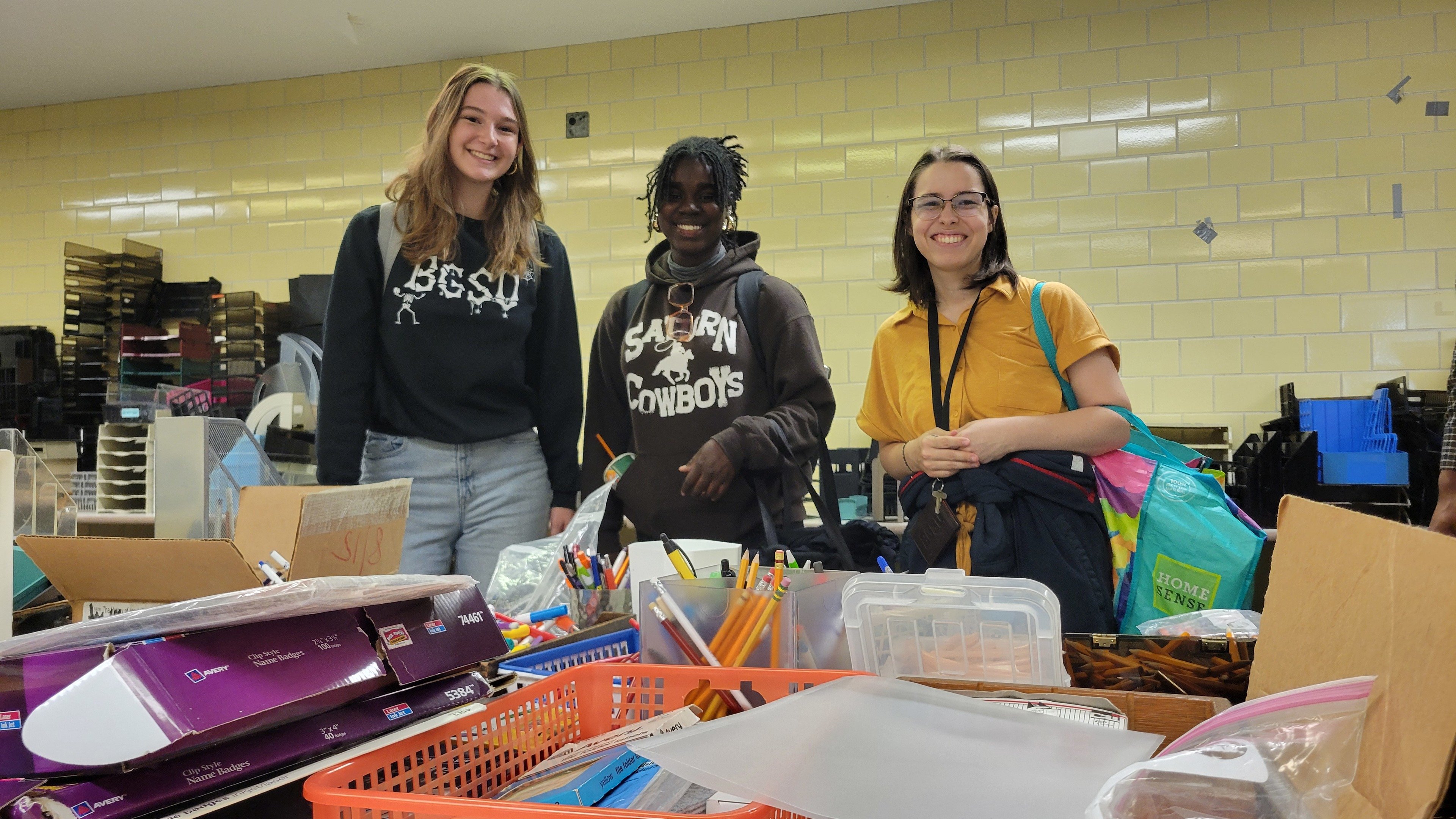
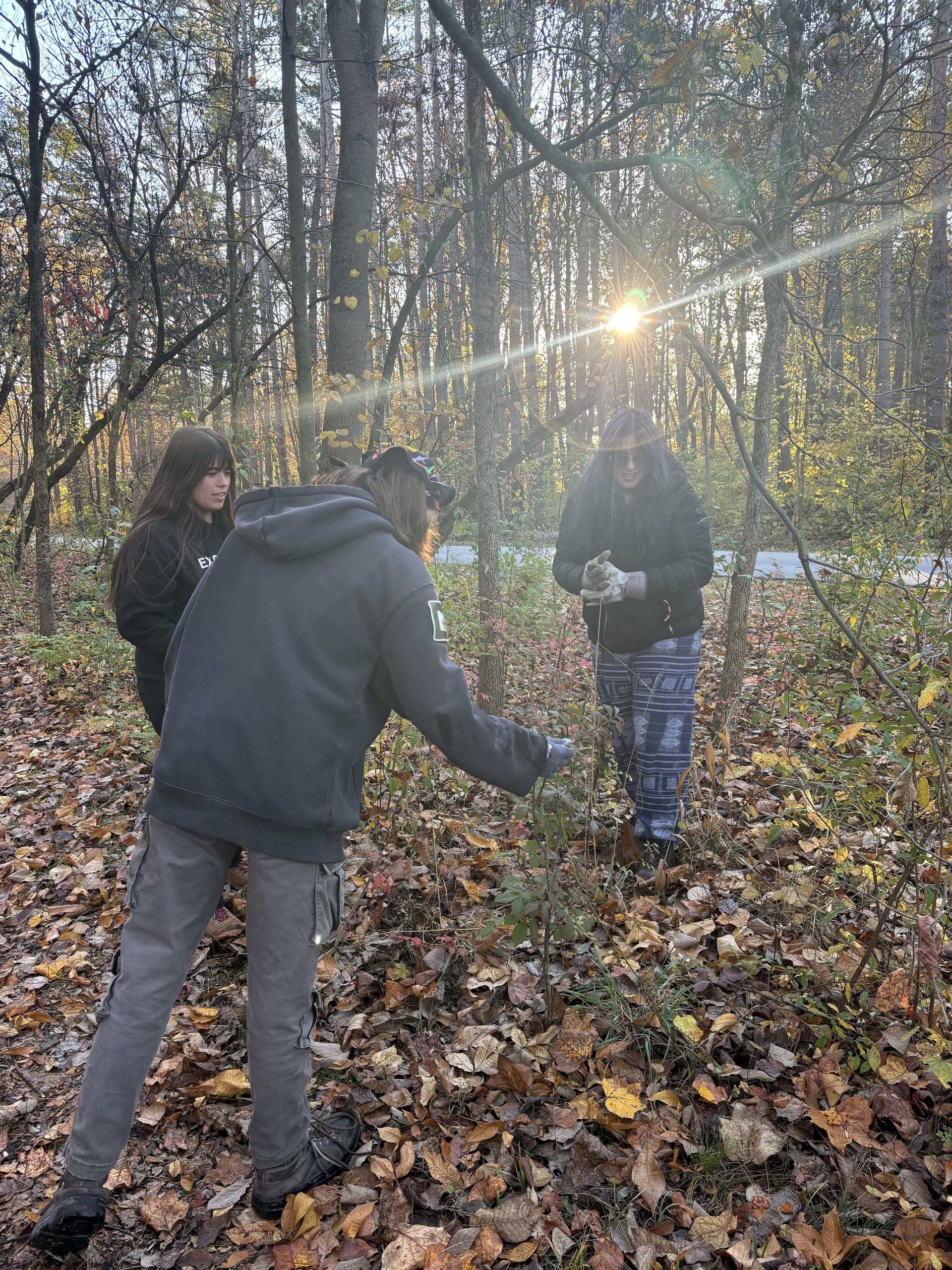
Camping at Oak Openings Preserve
On the night of Friday, October 25th our office hosted a campout in the White Oaks Campground at Oak Opening Preserve Metropark. In the evening participants enjoyed some s'mores around the campfire while getting to know one another. Following a chilly night in the tents, on the morning of Saturday October 26th, we packed up our tents, ate breakfast by the fire, and volunteered with the Metroparks Toledo staff pulling invasives such as Burning Bush, Autumn Olive, and non-native Honeysuckle. These invasive species cause a great deal of harm towards native fauna and flora. Removing these pesky plants is a great help to our local ecosystem! Invasive plant removal is important because these non-native plants limit water and soil resources and take sunlight away from other native plants that have symbiotically co-existed with the other beings within the ecosystem for thousands of years. It was a very immersive and educational bonding experience for everyone! Look out for another event like this one potentially in Spring, 2025.
How Culture Shapes the Climate Change Debate
To round out this year's Campus Sustainability Month, Dr. Andrew Hoffman from the University of Michigan came and gave a presentation on his research regarding how cultural lenses shape the way we as individuals perceive the debate on climate change. His seminar discussed the intersection of culture and climate action. Though the scientific community largely agrees that climate change is underway, debates about this issue remain fiercely polarized. He highlighted how these conversations have become a rhetorical contest, one where opposing sides try to achieve victory through playing on fear, distrust, and intolerance. At its heart, this split for many is less about carbon dioxide, greenhouse gases, or climate modeling; rather, it is the product of contrasting, deeply entrenched worldviews. Professor Hoffman examined what causes people to reject or accept the scientific consensus on climate change. His talk included actionable steps for all disciplines to tackle climate change and synthesized evidence from sociology, psychology, and political science. We were honored to welcome such a prestigious speaker to our campus and those in attendance were able to get their choice of a free copy of one of Dr. Hoffman's books.
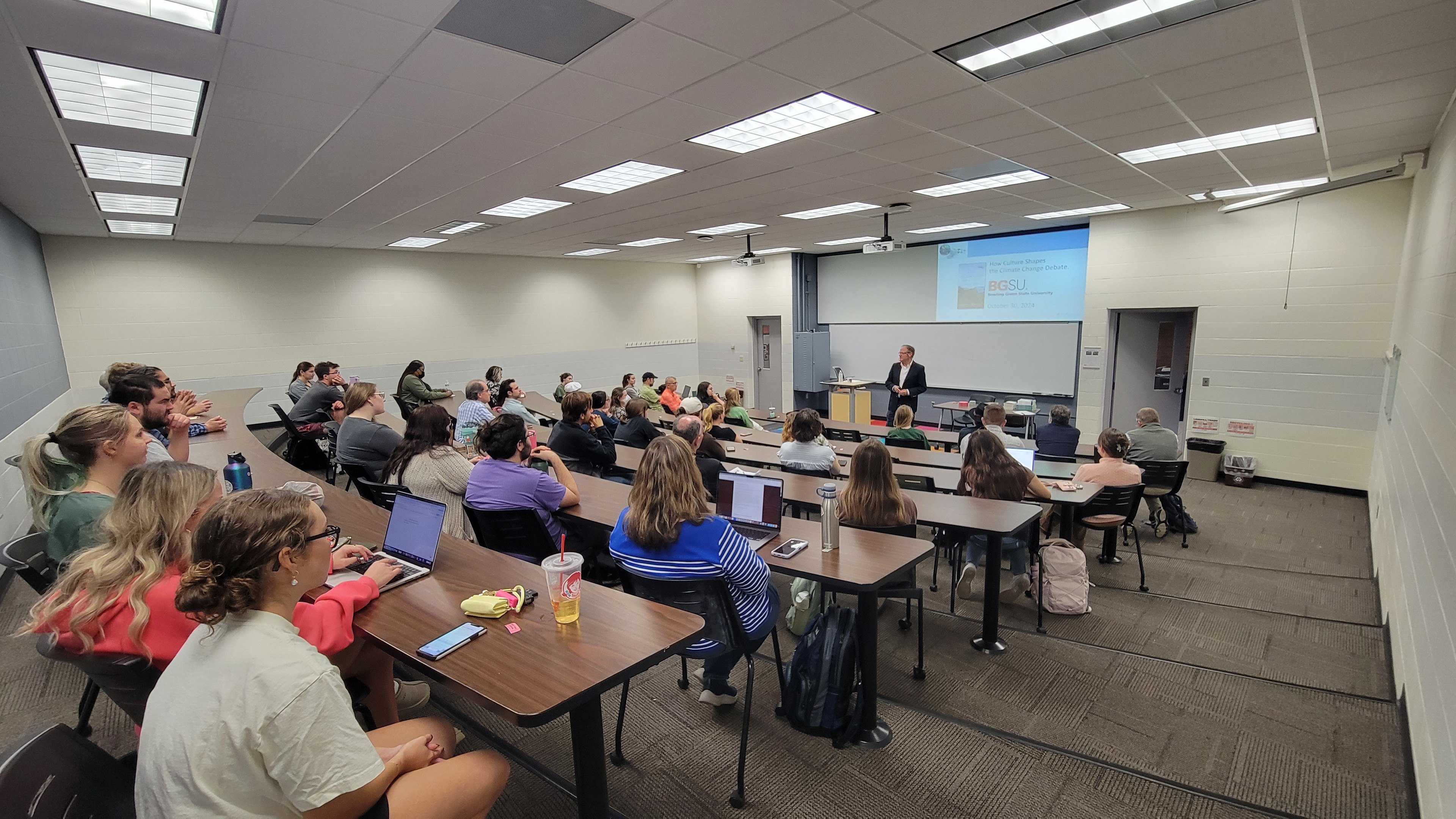
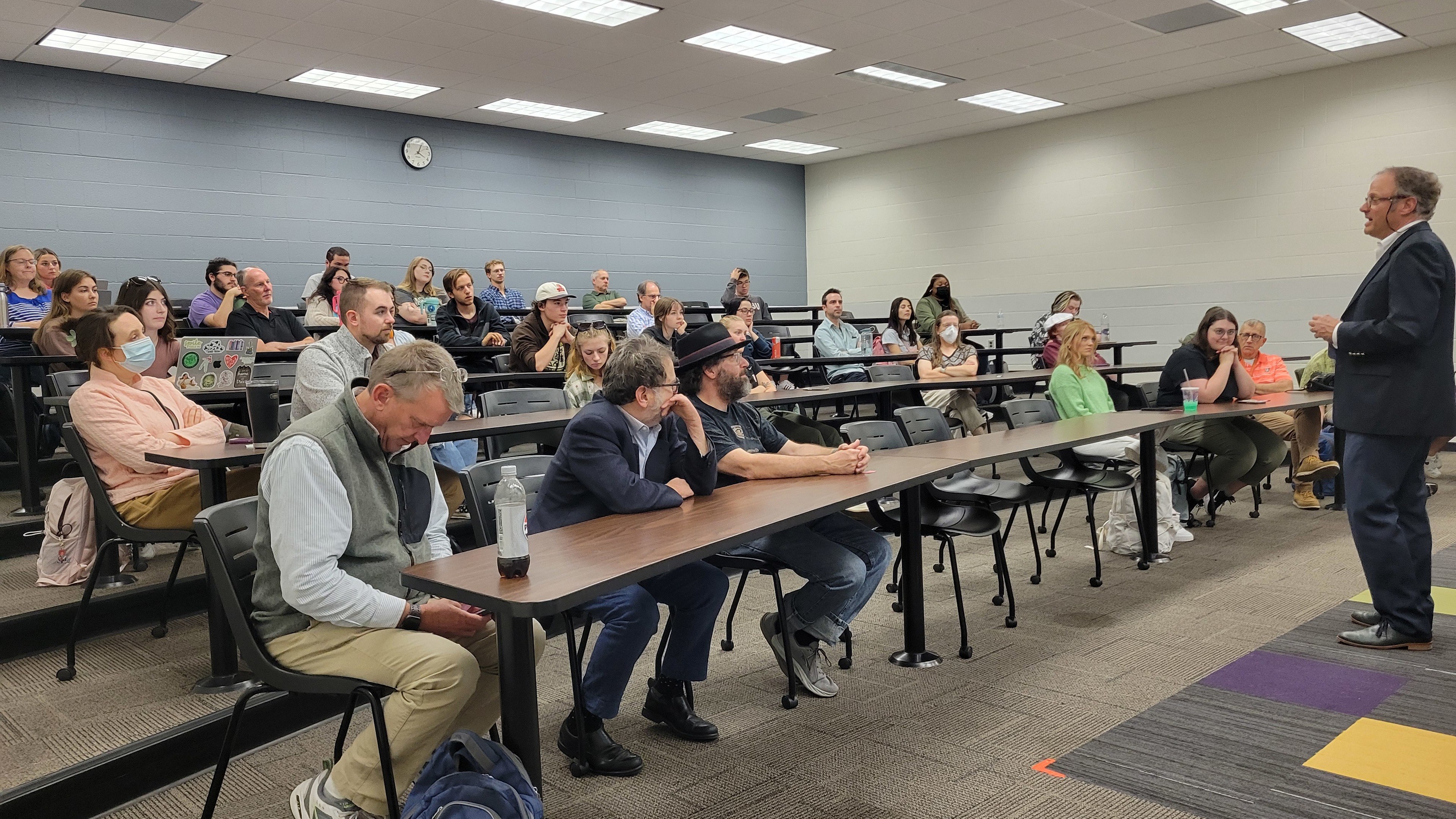
Every October at BGSU, you can expect a jam-packed schedule of sustainability related events! For many years, we've hosted a variety of educational, recreational, and service based events to engage students, faculty and staff more deeply in the realm of sustainability. We're also active year round in these types of events, so we hope to see you at another event or service project soon! After all, we couldn’t do all that we do without the involvement and support of the BGSU campus community.
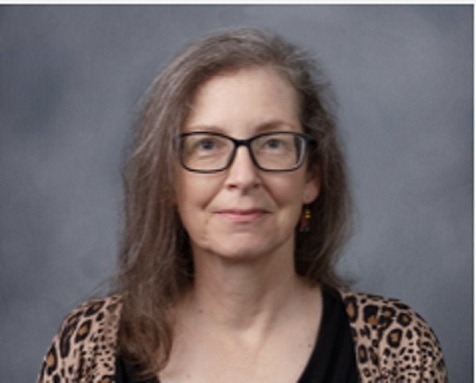
Eco Hero Spotlight
By Michael Kunst
Campus Sustainability Intern
Colleen Yarger: A Sustainability Champion
Colleen Yarger, an accounting specialist at WBGU PBS, has been named the EcoHero for the Fall 2024 Semester. Her commitment to sustainability is evident in her professional and personal life. The Eco-Hero Spotlight is an initiative started by Campus Sustainability to actively seek out and recognize individuals or groups that make an eco-friendly impact on BGSU. Anyone can be an Eco-Hero, so long as they are willing to do what it takes to promote sustainability.
Originally from Maryland, Colleen was inspired by her county's recycling efforts and began implementing sustainable practices in her home. At BGSU, she has been instrumental in promoting sustainability initiatives. While working as an administrative secretary in the School of Earth, Environment, and Society, she helped secure the Green Office Certificate. Green Office Certification is a program created by the BGSU Office of Campus Sustainability with the purpose of encouraging offices on campus to make conscious decisions about their environmental footprint. This program allows departments around campus to audit their daily functions to see what actions could be taken to use less energy or produce less waste. Colleen said that it was “the little things that counted.” She put up signs asking to unplug devices after use and advocated for reusing materials in the office, among other actions aimed at creating a sustainable office.
Colleen remains passionate about sustainability and continues to make efforts with her new office at WBGU PBS. She is impressed by BGSU's efforts, such as the new recycling (Ergocan) and trash containers that have been placed across campus in certain areas. These well-labeled bins have made it easier for students and faculty to dispose of their waste properly. Colleen has observed many people carefully reading the signage before disposing of their items, demonstrating a growing awareness of sustainability. She said, “this program was a good win for the university and has made it easy for people to dispose of their waste properly.”
Colleen is a strong advocate for reuse. She believes that the ReStore is a valuable resource for the university and encourages others to find creative ways to repurpose materials. The Campus Restore is a place operated by Campus Sustainability that offers a wide variety of gently used, donated items to BGSU students, faculty, & staff! In her personal life, she practices sustainable living by recycling, following a plant-based diet, maintaining a pollinator-friendly garden, and reducing the amount of energy she uses in her home.
When asked about how the BGSU community can become more sustainable, Colleen emphasized the importance of reducing food waste. She suggested that offices and departments could further contribute by collecting food waste from their daily consumption. She has noticed that when staff members eat their lunch or snacks that food waste ends up in the garbage because composting is not offered in offices. She expresses that individual offices creating their own composting program would significantly impact our sustainability efforts at BGSU.
Colleen's advice for current and future generations is to consider the long-term consequences of their actions. She encourages individuals to think beyond themselves and make decisions that benefit future generations. Colleen said, “don’t just think about yourself, we must make decisions regarding future generations.” By adopting a sustainable mindset, we can create a more resilient and environmentally friendly future.
Thank you, Colleen, for all of your efforts at making BGSU and your community sustainable!
Where Are
They Now?
By Zach Hayes
Assistant Sustainability Manager
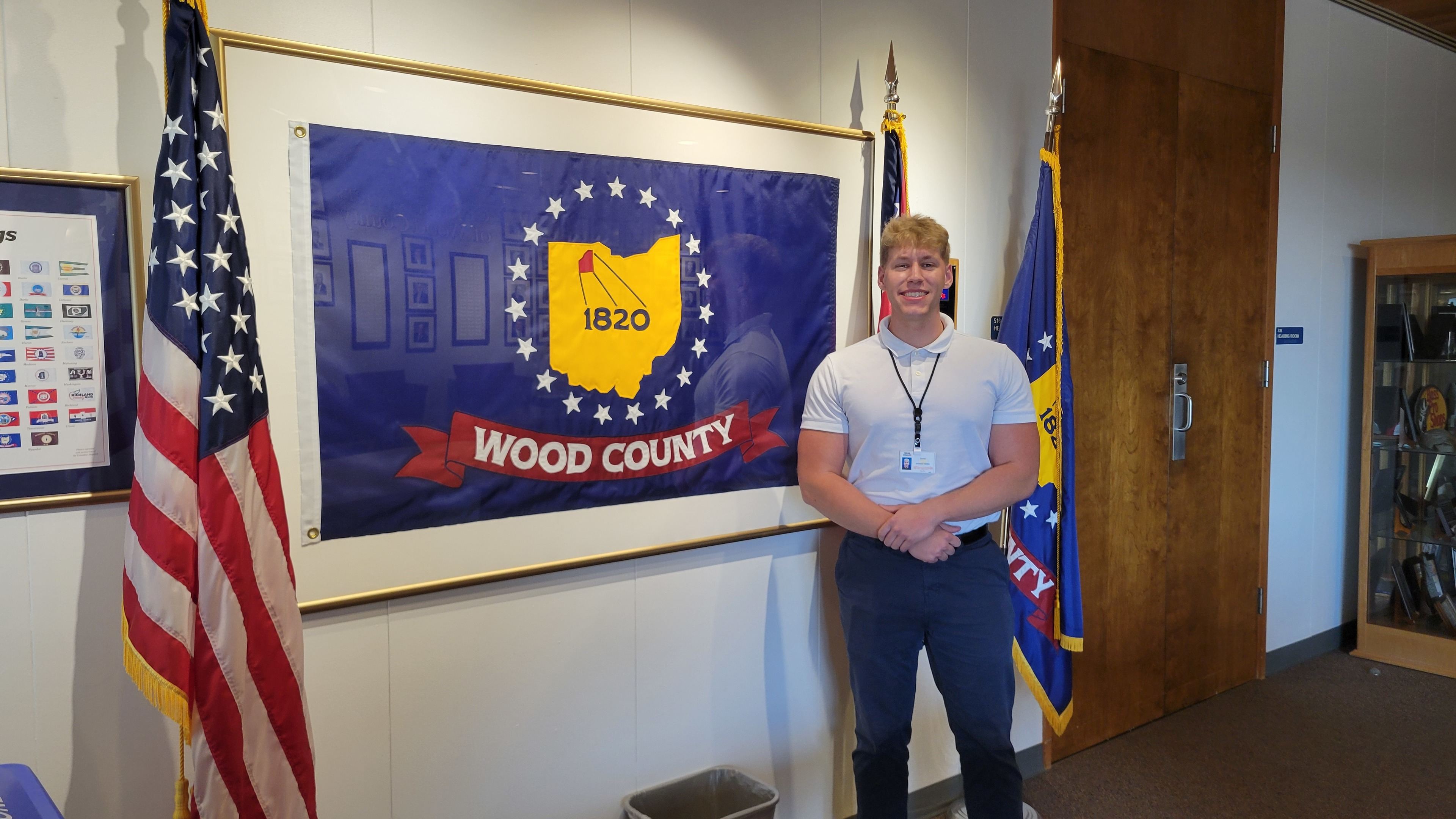
This Fall, the Office of Campus Sustainability reconnected with former intern, Zachary Nemec
Over the years, many interns have walked in and out of The Office of Campus Sustainability doors. These interns have made major contributions and impacts that have marked successful milestones for the Office of Campus Sustainability. We wanted to know what these interns have been up to and how the work they did as an intern has impacted their lives. Therefore, we started the newsletter series - “Where Are They Now?”
In this edition of our Newsletter, we caught up with Zachary Nemec who was an intern with Campus Sustainability from Spring 2023 – Spring 2024. Nemec was born and raised as a townie here in Bowling Green, OH. He graduated from Bowling Green High School and enrolled at BGSU, beginning in Fall 2020. He graduated in the Spring Semester 2024 with a Bachelor of Science in Environmental Science with a Concentration in Restoration. Joining the Campus Sustainability intern team during the summer between his third and fourth year at BGSU, Zachary was quick to adapt to any challenges he faced. Beginning in May of 2023, Zachary’s first Campus Sustainability event during his internship was a zero-waste appreciation picnic for BGSU staff members. The concept of zero-waste is that everything served is able to be either reused or recycled so that nothing ends up in the landfill. In the case of the picnic, all of the plates, cups, and utensils were biodegradable and able to be composted alongside uneaten food. Zachary helped with event setup and managed a waste station where he was able to monitor the compost collection process while also educating attendees about the zero-waste concept. From there, Zachary worked under the tutelage of Sustainability Manager, Dr. Nick Hennessy, and was an integral part of keeping the Office of Campus Sustainability running smoothly in the summer of 2023 and jumped in wherever needed. Whether it was running an orientation table and engaging with incoming students, maintaining one of our several green roofs on campus, completing work orders, or leading a group in a late-summer service project, Zachary was quick to learn and eager to help. Some of his favorite memories were from Summer Orientation with Dr. Nick. He’ll never forget the banter that he and Dr. Nick shared at their informational table. He also particularly enjoyed the events of Earth Month that he helped to plan for April 2024 such as the Eco Fair, Sustainability & Storytelling Panel and participating in the Slippery Elm Trail Bike Tour.
One facet of the Office of Campus Sustainability that Zachary Nemec became quickly acclimated to was graphic design and website updates. When Rumpke Waste & Recycling became our campus recycling provider in July 2023, Nemec redesigned the recycling signage to accompany the changes in acceptable materials. These signage updates are currently progressing in implementation across campus. Zachary’s impact on the Office of Campus Sustainability’s web presence was enormous. After completing the Adobe CMS training for website design, he went to work making sure that our website was updated and engaging to visitors. When asked which project of his that he was most proud of, he said “when Marketing and Brand Strategy finally approved the new redesign of the website's homepage. I remember it being a fairly involved process that took some time. I was so proud and invested in it that I would design it during class when not even at work.” You can view Zachary’s work on our homepage here: https://www.bgsu.edu/sustainability.
So where is Zachary Nemec now? True to his Bowling Green roots, he is still here! As he approached graduation, Dr. Nick recommended that Zachary use him as a reference and apply to a particularly local position. Since June 2024, Zachary has served as the Outreach and Program Planner for the Wood County Solid Waste Management District. His position is under the Wood County Commissioners and his office is in the Wood County Courthouse complex, but a big part of his job is outreach and engagement at events around the county, such as different Township Safety Days, Recycle-a-Thons, or the Wood County Fair. Similar to how he spent time as an intern educating the campus community about recycling and other sustainability initiatives, Zachary is now facilitating recycling education in K-12 classrooms and giving tours of the Wood County Landfill and Bowling Green Recycling Center. Given his studies in Environmental Science, Zachary said that he never expected to be an educator, but he loves that he can instill a similar passion for sustainability in grade-schoolers.
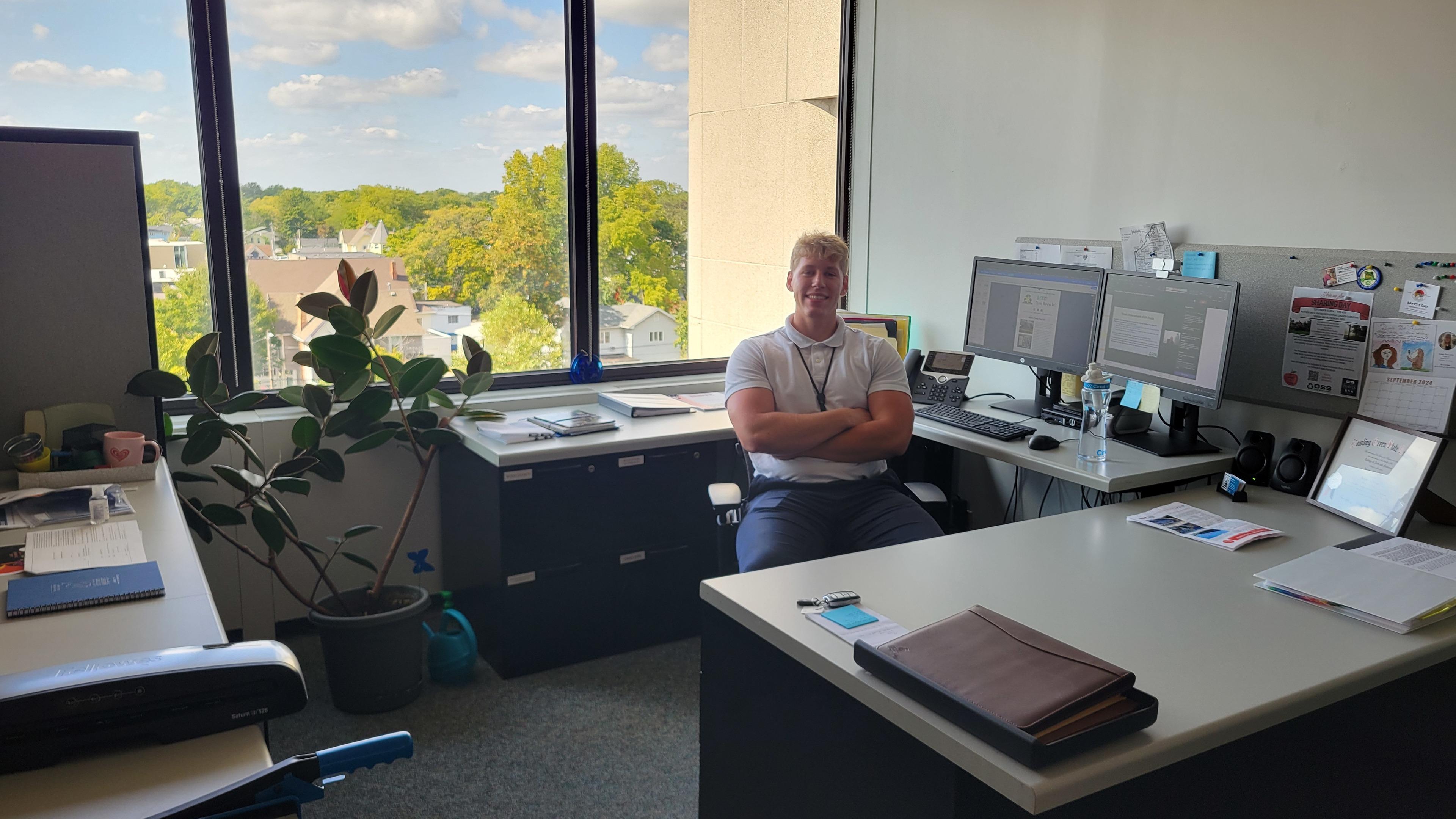
Since joining Wood County Solid Waste Management District, Zachary has learned a lot about the county that he’s lived in his whole life. This position, he says, “has opened my eyes to the rest of the county”. Wood County features 13 residential recycling drop-off locations for residents and curbside recycling in Bowling Green, Perrysburg, and Haskins. This means that Wood County is exceeding the compliance rate set by the Ohio EPA that 80% of county residents must have access to recycling. A big part of Zachary’s job is informing residents where those drop-off locations are. The Ohio EPA also mandates that every county in the State of Ohio have its own Solid Waste Management District with an approved plan for managing solid waste every 5 years. For Wood County, the goals of recycling at least 25% of the solid waste generated, and meeting the comprehensive outreach and education requirements are all a part of Zachary’s job.
The majority of BGSU students are not from Bowling Green, and do not stay in the community after graduation. Zachary Nemec is an exception and truly cares for his hometown. He states, “Wood County raised me. Now I want to give back and make Wood County as sustainable as possible.” It’s clear that Zachary has really enjoyed his new position so far and is still growing into his role. He said, “I guess being from here, you would think that I would know a lot about Wood County, but I'm learning stuff every day.” Nemec came to his new job with several ideas that he brought over from his internship at the Office of Campus Sustainability. He started and manages an Instagram account (@recyclewoodcounty) for the Wood County SWMD to share relevant recycling information. Zachary also started an electronic waste recycling program in his office that was inspired by his time as an intern.
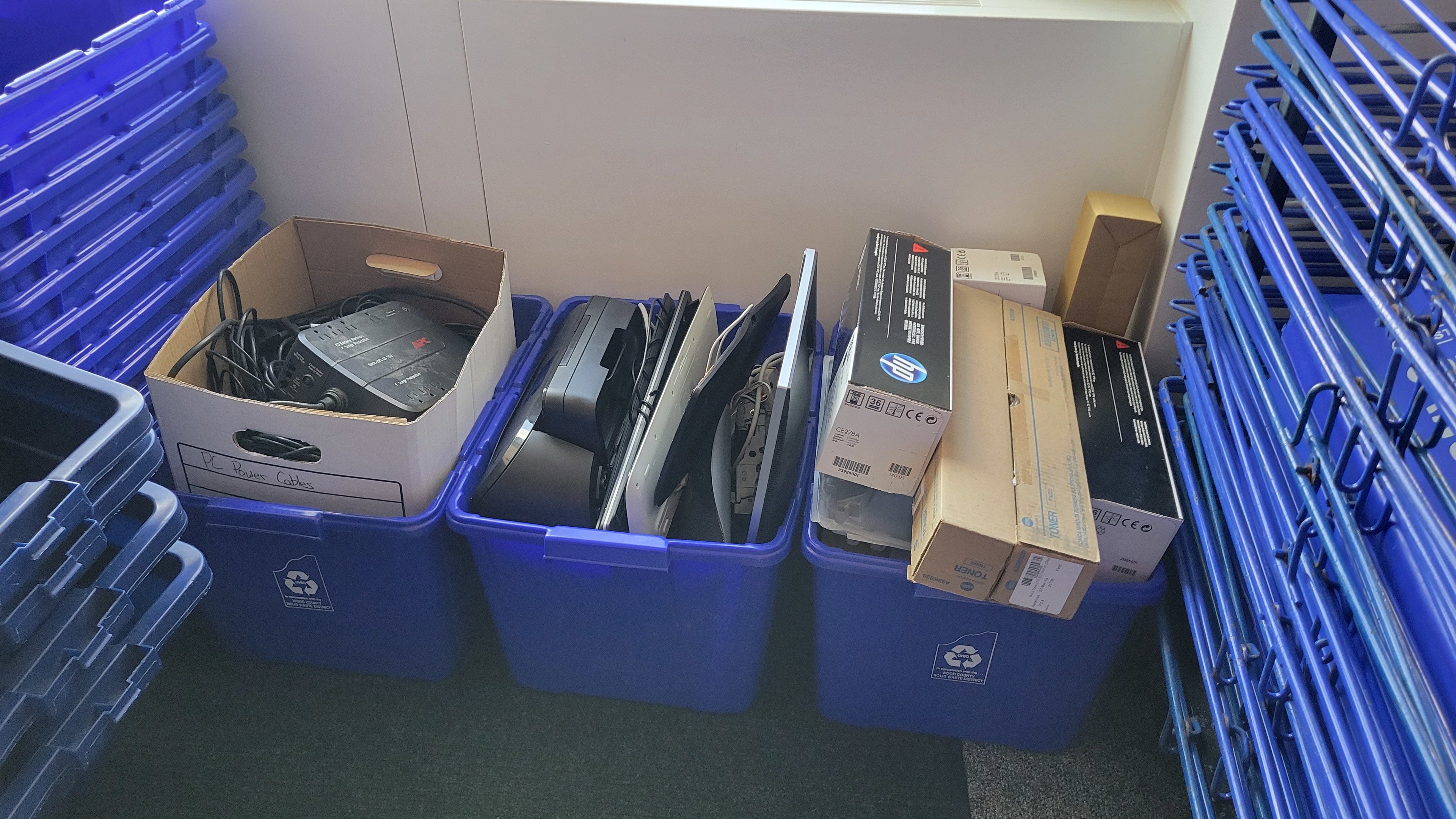
The Office of Campus Sustainability runs BGSU’s electronic recycling program and works with AIM eCycling based out of Toledo. Nemec is coordinating with them to pick up from the courthouse when they travel to BGSU to pick up e-waste.
While you may no longer see him around BGSU, he isn’t far away. You’re bound to catch him at community events such as the Wood County Fair, or the Black Swamp Arts Festival where he helped manage volunteers who ran the recycling program over the weekend. He also assisted with a stormwater cleanup hosted by BGSU in collaboration with Partners for Clean Streams. Zachary credits his internship experience and working with Dr. Nick as the reason he was able to get the job with Wood County very shortly after graduation. He is very grateful for the professional experience he gained through the Office of Campus Sustainability and to still be able to serve the Bowling Green community he’s called home his whole life. When asked what his advice would be for current BGSU students, he responded, “this is for any student who may have hit a bump in their BGSU journey. Never feel discouraged if the plan you drew up when entering BGSU doesn't pan out how you thought it should. Nothing is set in stone. College has this unique ability to change our course and unlock new doors we never knew existed. As long as what you are achieving is something you are passionate about, it will feel less and less like a chore and more like a gift that you will always be excited to open.” It’s safe to say that he embodies his own advice as he uses his BGSU degree daily in a field that he’s passionate about. We look forward to future collaborations with Zachary Nemec and are excited to see the ways that he will continue to bring about a greater level of sustainability throughout Wood County.
Updated: 10/31/2024 05:54PM
